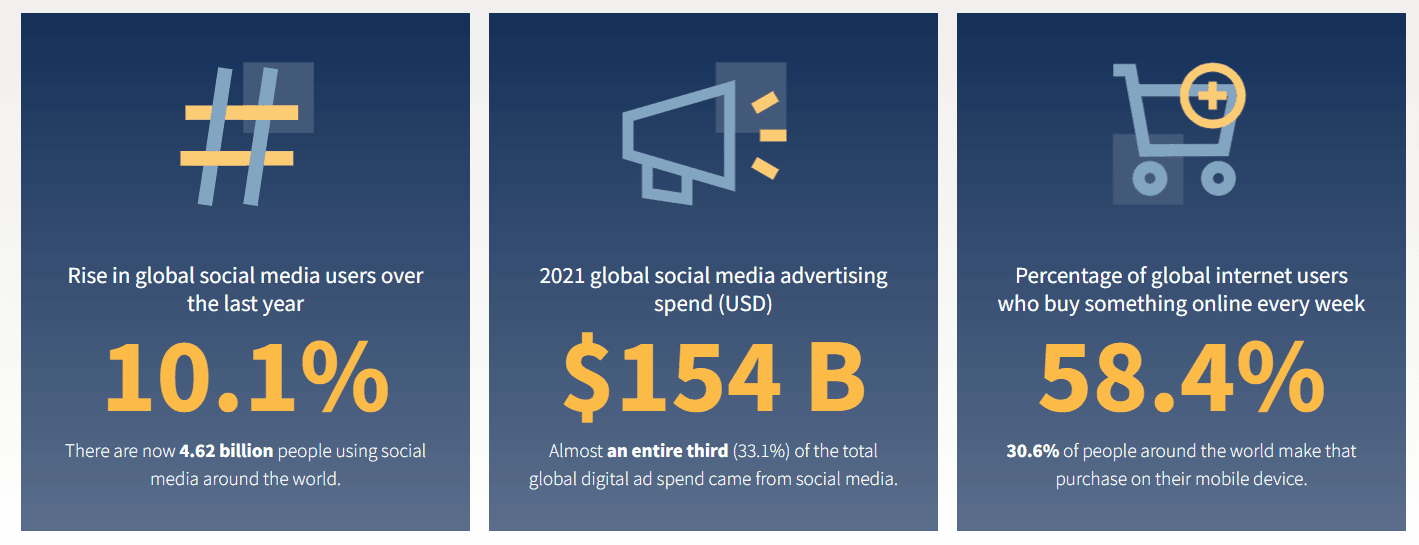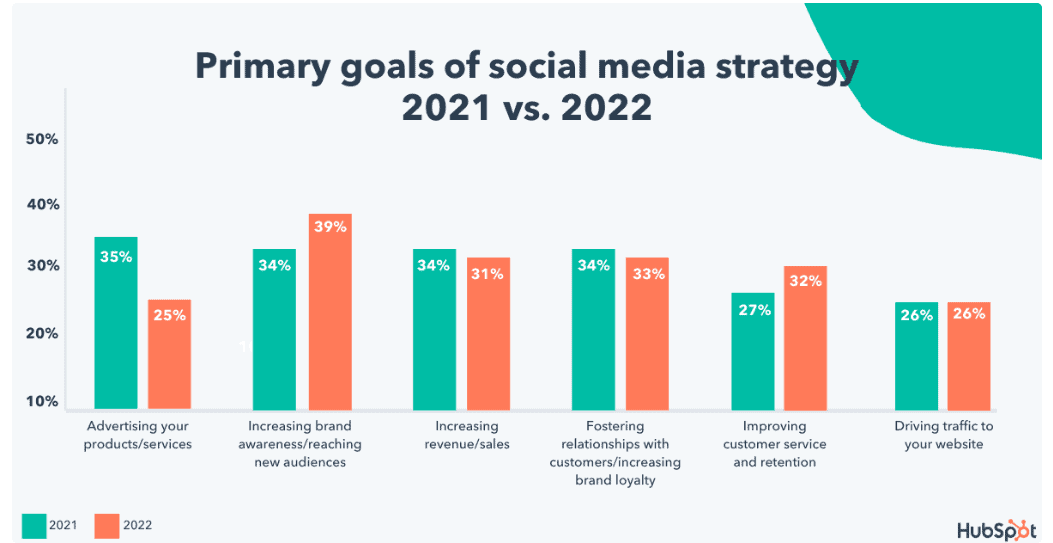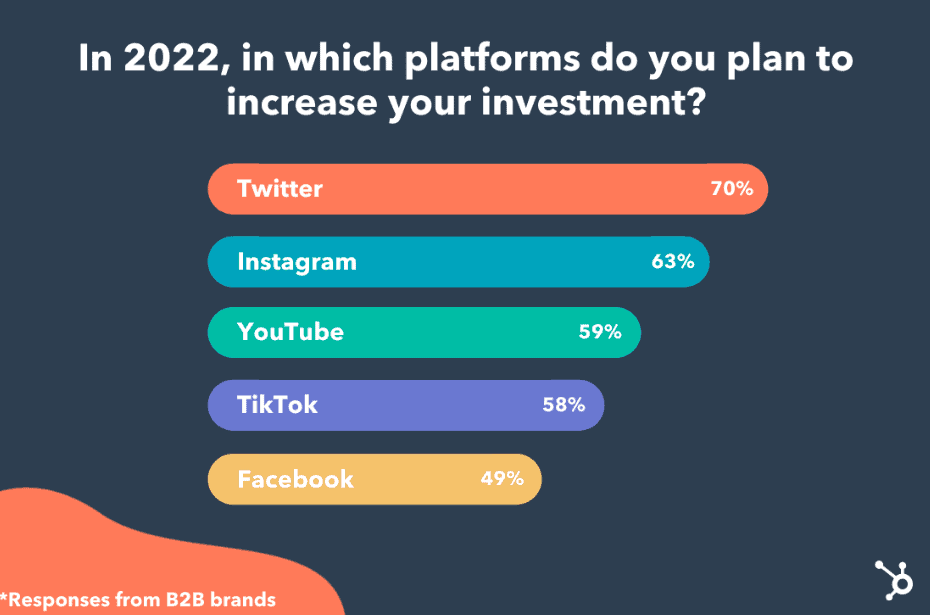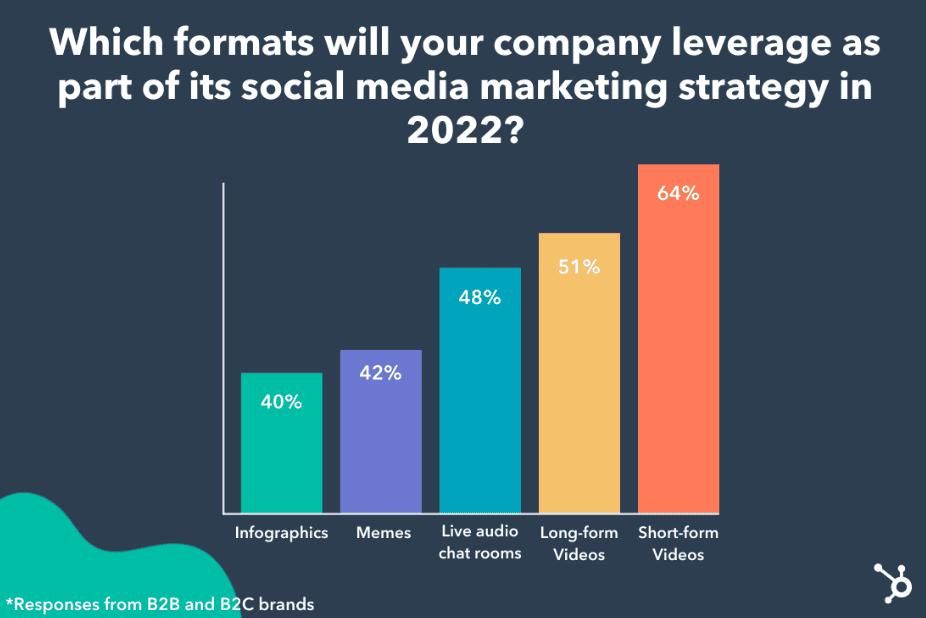Social media is a gold mine for marketers who understand the game and devise the right strategies. Creating an appropriate social media budget for your small business is key to leveraging social media for business growth.
Do you know that in 2021 alone, a whopping $154 billion was spent globally on social media marketing?

Image via Hootsuite
This number shows how important social media has become for marketers and how stiff the competition is.
With this crowded market, social media marketing can get a bit overwhelming for small businesses. And in an effort to cope with the fierce competition, these businesses may spend too much on too many tactics that may not eventually yield the desired results.
What’s the way out?
Make a well-planned social media budget for your small business.
Before planning a social media budget for your small business, learn how to plan and what should this budget consist of. And that’s exactly what I’ll be discussing in this post.
Let’s get started.
7 Tips to Make an Effective Social Media Budget for Your Small Business
Businesses set aside anywhere from millions to just a few hundred dollars on their social media budgets. Regardless of how much you spend, what matters is how and where you spend that amount.
Here are the 7 proven tips to create an effective social media budget for your small business and get a higher ROI.
1. Define Your Audience
There are more than 4.5 billion social media users in the world, but would they all qualify as your audience?
Definitely not. As a small business owner, you need to know whom to target with your marketing communications before investing your time, resources, and money.
In-depth research of who your audiences are, their pain points, and preferences will help you effectively plan a social media budget for your small business.
Create different user personas representing the audience you want to reach on social media. This will also help you add personalization in your social media strategy.
2. Stay Focused on Your Goals
Your marketing goals should be the foundation for the social media budget for your small business. Until you know what you want to achieve, how will you allocate resources in your budget?
According to a HubSpot survey, here are the top-rated social media goals for brands currently.

Image via HubSpot
Do you have similar goals?
Then allocate funds according to your goals.
For example, let’s say building brand awareness is your goal. You should allocate more funds for creating paid ads or influencer campaigns to increase brand visibility than for upgrading your lead generation solution because it will not help in any way to achieve your goal.
Once you are clear about your social media marketing goals, you can create a social media budget for your small business accordingly.
3. Choose the Right Platforms
If you think your brand should be present on all social media networks, you are mistaken. Instead of spending your budget on creating a brand presence on 20 different social media channels, focus on the right ones.
What are the top social networks you should consider?
HubSpot says that marketers are planning to invest heavily in Twitter and Instagram in 2022. You can consider including these in your social media strategy.

Image via HubSpot
Based on your audiences’ interests, preferences, and age, you can select the right platforms. Focus on these networks while planning the social media budget for your small business to ensure better engagement. A fractional CMO can help you in case to choose the right platform for your social media marketing strategy in cost effective way.
4. Analyze Your Previous Spending
If you’ve been spending on social media marketing for some time, analyze your past spending on social media campaigns, digital marketing tools, and outsourced services. Also, calculate your ROI.
Identify your mistakes like areas where you overspent and got a low ROI, and avoid those mistakes in the future. The insights drawn will help you create a social media budget for your small business without loss or overspending.
Analyzing your spending on each social media campaign will also help you figure out what works for your audience. You can use resource management software and allocate more resources to areas that tend to perform better.
5. Set Aside Some Amount for Giveaways
Everyone loves gifts!
Your social media audiences are no exception. That’s why while creating a social media budget for your small business, you should allocate a certain portion for giveaways and free gifts.
Although they should be used sparingly, giveaways are highly effective in increasing engagement. They can boost curiosity about your products or services, and grow your following.
By including giveaways in the social media budget for your small business, you can give your team the flexibility to create effective and compelling campaigns.
6. Outsource Certain Areas
When planning a social media budget for your small business, think about tasks that your in-house team can work on and those that need to be outsourced.
For instance, if a freelancer is ready to create graphics or videos for you at a nominal rate, it is a wise decision to outsource that task rather than hire a graphic designer.
Your in-house social media team can focus on strategizing and using that content to build brand awareness.
What this means in terms of budget is that you would not only be spending less but also making the most out of that investment.
7. Always Create a Budget Proposal
Creating a budget proposal is crucial while setting a social media budget for your small business.
A comprehensive budget proposal will act as a road map for your entire year’s social media marketing strategies and how much will be spent on what activities.
Strong social media presence can also help you get better SEO results. Social media for better SEO results as well. Invest in your social media is great option for better result.
Having it handy will help you to tweak the budget if and when necessary. Here are a few things you should do when making your social media budget proposal.
- Categorize your expenses and create sub-categories for specific items
- Segregate in-house and outsourced expenses
- Estimate the time allotment for various activities
What Should You Include in the Social Media Budget for Your Small Business?
With these tried and tested tips, you are all set to plan an effective social media budget for your small business.
To facilitate your budgeting process, consider utilizing the Evontos Receipt Template to streamline expense tracking and ensure accuracy in financial documentation.
Below are areas for which you should allocate funds in your budget. Take a look.
1. Content Creation
When you create content for social media, it has to be diverse, fresh, and witty. It should most certainly pique the readers’ curiosity. The content formats mentioned below are quite popular with social media audiences right now.

Image via HubSpot
But how will you decide which is the right one for you? I say, test and gauge the response of your fans to the content you post.
While allotting a budget for content creation and production, consider your content strategy and its requirements.
Depending on the expertise of your team, you might either opt for in-house content creation or outsource it. Whatever you do, strive to create engaging social media copy and visual posts if you want to boost brand awareness on social media.
2. Social Media Marketing Tools
These tools can enhance efficiency, boost creativity, and generate rich data for analysis. A portion of the social media budget for your small business should be dedicated to paying the monthly or annual subscription fees for tools like:
- Design and editing tools
- Social media management tools
- AI video generator tools
- Social media analytics tools
- Social CRM tools
With your budget restrictions, you might first want to try the free versions of some of these tools and buy the subscription only if you need it.
3. Employee Training
Social media is constantly evolving and if you want to be on top of your game, your social media team should possess the right skills to do their jobs.
A portion of the social media budget for your small business should, therefore, be invested in providing quality training to your employees.
There are several online training options you can consider based on the social media budget for your small business and your employees’ skill levels. LinkedIn Learning, Hootsuite Academy, and many more platforms are available for you to choose from.

Image via LinkedIn Learning
Including such training in the social media budget for your small business will, at the end of the day, help strategize better and help your business grow.
4. Paid Campaigns
Another vital component of the social media budget for your small business would be paid social media ad campaigns.
The ultimate goal of all your social media activity is to engage your target audience, build a brand reputation, and generate quality leads for your business. And to achieve these goals, social media ads are absolutely necessary.
By investing in the right kind of tailored ads and with smart ads retargeting, you can achieve amazing results.
5. Influencer Marketing
It has taken the digital marketing industry by storm and a majority of marketers consider it vital for their social media marketing. That’s why you should consider dedicating a portion of the social media budget for your small business to influencer marketing.
You can research on Instagram, Facebook, or YouTube to find some good influencers in your niche. Alternatively, an influencer marketing firm can also help you get in touch with the right influencers to promote your brand and products.
You can either pay influencers a fixed amount for the whole campaign or create an affiliate plan to build long-term relationships. You should go back to your customer personas and social marketing goals to create the most effective influencer marketing campaigns.
Ready to Set an Effective Social Media Budget for Your Small Business?
Creating a sustainable social media budget for your small business is no child’s play, especially if you have a limited amount of money.
But the tips that I have shared will surely give you a good start and help you allocate your resources to all the right tactics to increase ROI.
Go ahead and create an impressive social media budget for your small business and reap all the benefits of social media marketing.

